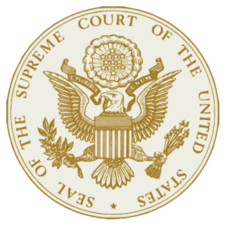Help us improve in just 2 minutes—share your thoughts in our reader survey.
Nash v. Florida Industrial Commission
 | |
| Nash v. Florida Industrial Commission | |
| Reference: 389 U.S. 235 | |
| Term: 1967 | |
| Important Dates | |
| Argued: November 9, 1967 Decided: December 5, 1967 | |
| Outcome | |
| Florida Third District Court of Appeal reversed | |
| Majority | |
| Earl Warren • Hugo Black • Abe Fortas • Potter Stewart • William Douglas • William Brennan • John Harlan II • Byron White Justice Thurgood Marshall took no part in the consideration or decision of the case. | |
Nash v. Florida Industrial Commission was a case decided on December 5, 1967, by the United States Supreme Court, which ruled that Florida could not deny Nash benefits under the joint federal-state unemployment insurance program for filing an unfair labor practice charge against her employer with the National Labor Relations Board.[1][2]
The Supreme Court reversed the lower court's opinion and held that Florida's denial of benefits violated the National Labor Relations Act.[1][2]
Background
Minnie Nash's employer laid her off, claiming the company did not have enough work to keep Nash on the job. Nash was approved for unemployment insurance, which she received for about one month. Nash stopped receiving payments after she filed an unfair labor practice charge against her employer claiming she was laid off because of her previous union activity. The Florida Industrial Commission said the unfair labor charge voided her eligibility for benefits under Section 443.06 of the Florida Unemployment Compensation Law, which stated employees could not claim unemployment insurance benefits if their unemployment was due to a labor dispute.[1][2]
Nash filed suit in the Florida Third District Court of Appeal, alleging Section 443.06, as applied, penalized her for reporting her employer to the National Labor Relations Board in violation of the National Labor Relations Act and was unconstitutional under the Supremacy Clause. The appellate court did not grant certiorari in the case.[1][2]
Oral argument
Oral argument was held on November 9, 1967. The case was decided on December 5, 1967.[1]
Decision
The Supreme Court decided 8-0 that the Florida Unemployment Compensation Act, in denying Nash unemployment compensation for filing an unfair labor practice charge with the National Labor Relations Board, conflicted with the National Labor Relations Act and violated the Supremacy Clause. Justice Hugo Black delivered the opinion of the court, joined by Chief Justice Earl Warren and Justices Abe Fortas, Potter Stewart, William Douglas, William Brennan, John Harlan II, and Byron White. Justice Thurgood Marshall took no part in the consideration or decision of the case.[1]
Opinions
Opinion of the court
Justice Hugo Black, writing for the court, said the Florida Unemployment Compensation Act, in denying Nash unemployment compensation for filing an unfair labor practice charge with the National Labor Relations Board, conflicted with the National Labor Relations Act in violation of the Supremacy Clause:[1]
| “ | We have no doubt that coercive actions which the Act forbids employers and unions to take against persons making charges are likewise prohibited from being taken by the States. The action of Florida here, like the coercive actions which employers and unions are forbidden to engage in, has a direct tendency to frustrate the purpose of Congress to leave people free to make charges of unfair labor practices to the Board. Florida has applied its Unemployment Compensation Law so that an employee who believes he has been wrongly discharged has two choices: (1) he may keep quiet and receive unemployment compensation until he finds a new job or (2) he may file an unfair labor practice charge, thus under Florida procedure surrendering his right to unemployment compensation, and risk financial ruin if the litigation is protracted. Even the hope of a future award of back pay may mean little to a man of modest means and heavy responsibilities faced with the immediate severance of sustaining funds. It appears obvious to us that this financial burden which Florida imposes will impede resort to the Act and thwart congressional reliance on individual action. A national system for the implementation of this country's labor policies is not so dependent on state law. Florida should not be permitted to defeat or handicap a valid national objective by threatening to withdraw state benefits from persons simply because they cooperate with the Government's constitutional plan.[3] | ” |
| —Justice Hugo Black, majority opinion in Nash v. Florida Industrial Commission[1] | ||
See also
- Federalism
- Unemployment insurance
- The Hughes Court
- Supreme Court of the United States
- History of the Supreme Court
External links
- Full text of case syllabus and opinions (Justia)
- Supreme Court of the United States
- Search Google News for this topic
Footnotes
- ↑ 1.0 1.1 1.2 1.3 1.4 1.5 1.6 1.7 Justia, "Nash v. Florida Industrial Comm'n, 389 U.S. 235 (1967)," accessed November 8, 2021
- ↑ 2.0 2.1 2.2 2.3 Cornell Law School, "Minnie E. NASH, Petitioner, v. FLORIDA INDUSTRIAL COMMISSION et al.," accessed November 17, 2021
- ↑ Note: This text is quoted verbatim from the original source. Any inconsistencies are attributable to the original source.
| |||||||||||